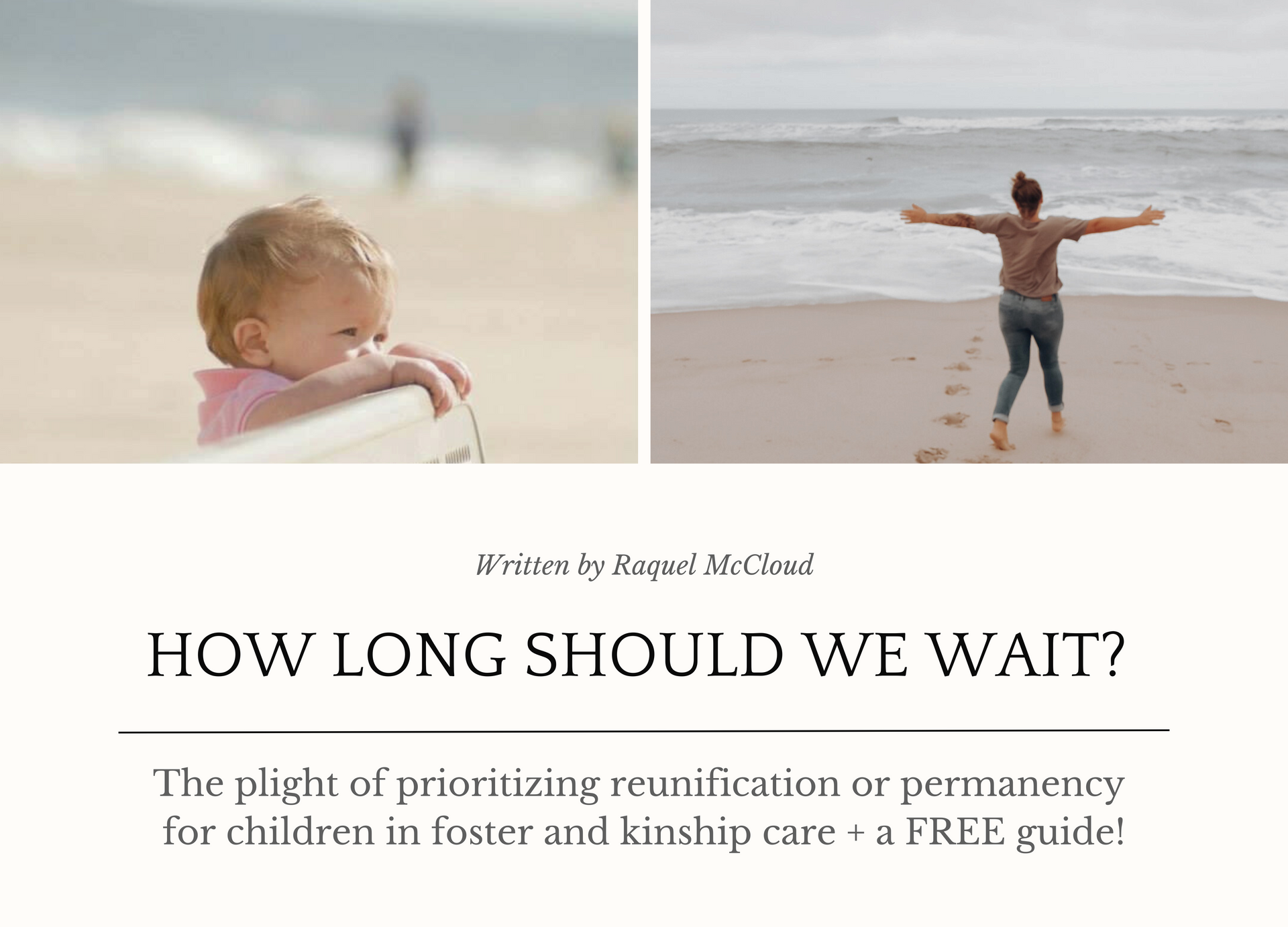How long should we wait?
The plight of prioritizing reunification or permanency for children in foster and kinship care.

When a child enters foster care through the child welfare system their biological parent or parents are presented with a case plan which is a written, goal-oriented, time-limited individualized plan for the child and the child's family. It is developed by the department to achieve what’s needed for the child's safety, permanency, and well-being. Full transparency, I have no lived experience inside this system, just countless stories vulnerably shared with me from those who do. I, on the other hand, was right outside of its grasp. I was a child of informal kinship care, which is just a fancy way of saying my grandparents chose to take over raising me before the state had a chance to step in. There are no case plans for the biological parents of children in kinship care placements outside of the child welfare system. There are no mandatory parenting classes, no rehabilitation centers, no drug tests or sobriety goals. Essentially, there is no accountability, no time-line and a bit more patience than what we typically catch wind of in non-relative foster placements.
I don’t want to spend too much time on definitions, statistics and studies but fewer people have heard of kinship care which will leave some gaps in the rest of the article if we don’t address it upfront. Simply put, it’s the same concept as foster care except it prioritizes placing a child in the care of someone they likely already have a relationship with, either kin or fictive kin. There are more than 390,000 children and youth in foster care in the United States and approximately 2.5 million in kinship care, in both formal and informal arrangements…but mostly informal. Growing up in the south, I can attest to just how common it is for grandparents, aunts, uncles, cousins and even older siblings to be raising their grandkids, nieces, nephews, cousins, sisters and brothers. Not only was I a child of kinship care, having been raised by my grandparents until I was fourteen but at twenty-four years old I became a kinship caregiver to my newborn half sister, a title that remained until finalizing her adoption nearly five years later.
For decades biological parents with kids in the child welfare system have been openly admonished, demonized and generally viewed as a lost cause. Their children, however innocent, were often labeled and persecuted for behaviors we now understand are borne from the trauma they’ve endured…it’s a vicious cycle. Somewhere between the rise of social media and the growing number of studies, more people have come to realize that foster care should not be viewed as an adoption agency and whenever possible, safe, and healthy, reunification should remain the goal. But how long is long enough for the children hanging in the balance?
According to the Adoption & Foster Care Analysis & Reporting System (AFCARS), children spend twenty months, on average, in the foster care system in the United States and while I can’t find any data, nearly every informal kinship care arrangement I’ve ever known about has lasted until the child turned eighteen. Though I’ve seen some of the worst I still recognize that isn’t every story and yet it’s unfair to bypass this truth. Not every biological parent consumed by addiction and all the travesty that includes will stay bound to those unfortunate circumstances…but many will. I recently read that about 50% of children in foster care will reunify with their parents but of that 50% more than half will reenter the foster care system again. Having grown up navigating the ebb and flow of addiction, I have to ask, why can’t we prioritize stability and permanency for the children without completely exiling biological parents?
Admittedly, I don’t have all the answers and anyone who has ever found themselves walking through this community will likely agree, it's undeniably nuanced, robustly complex, and because of this there is no room for blanket statements. Where I lack the ability to toss out a one size fits most solution (what so many of us rightly want) I overflow with life experience and an eagerness to share. I didn’t even realize this was a
thing
until I was in the last chapter of my Professional Trauma & Resilience certification coursework.
Peer to peer messaging
and
the restorative narrative
are viable pathways forward. They are quite literally the definition of learning from those who have lived it. And so, that is what this is…more than studies and statistics it is a story of deep understanding, healing and a desire to create a better future for those who come after me. This is my experience of growing up without permanency as a child of kinship care.
There is a 40% chance of relapsing within the first two years of recovery but after three years in recovery, the risk of relapsing reduces to around 9.6%, and then goes down once more to 7.2% after five years in recovery. I don’t believe anyone was truly waiting for my father to stay clean, by the time I was born he had already spent more than a decade fighting this hellacious disease so why did I remain under guardianship instead of moving towards the permenancy of adoption? A few years ago my curiosity got the best of me so I asked my grandma that exact question.
“Well, you already knew who your daddy was and we thought we were doing what was best to just leave it that way.”
And I wholeheartedly believe her. Their intentions were pure. Again, kinship care was so common where I grew up, both within my family and the community, that I never even remember feeling as though I was too different, it was just how it was. Another poignant truth is this: Thirty-five years ago, not many people were discussing all the intricacies of these circumstances. It was seldom acknowledged, let alone considered how it might affect the children…and so I, like many others, remained suspended between the stability my grandparents provided, the secrecy of my biological mothers absence, and the chaos of my father.
Nearly every adoptee, former foster youth or kinship care kid will acknowledge having to wrestle through feelings of abandonment. I’m no exception. My biological mother, I’m told, willingly signed her termination of parental rights (TPR) when I was around two years old, and my biological father did not. He hated the thought of relinquishing his title as ‘Dad’, so he didn’t. It was his parents that gained shared custody of me with him. I like to say that Dad was consistently inconsistent. He wasn’t absent but he wasn’t exactly dependable either. He had a kind heart and desperately wanted to be a good father but addiction is an unforgiving disease and it would hold him captive until his untimely death at just fifty-two years old. I believe that time has a way of softening us if we allow it to, and I have. Looking back I’m able to separate the good from the bad, I’m able to see what I couldn’t in the thick of our dysfunctional relationship, I’m able to rationalize what could have been done differently in spite of his battle with addiction, to cultivate a healthier relationship while also prioritizing my rights to safety, stability and permanency. It’s something I’ve ruminated on for a while…I even created a resource guide for other kinship care providers walking through this same struggle. It’s a profoundly simple concept: boundaries before walls.
Perhaps the most difficult idea to grasp is that
‘safe’
is a subjective concept. While many people who have never been forced to interact with all these big, scary things like addiction, mental health diagnosis, and poverty may believe the mere existence of these struggles make someone unsafe, they are often just uncomfortable, not unsafe. My father’s active addiction made him an unsafe caregiver, not an unsafe presence in my life but without proper resources my grandparents struggled to set reasonable boundaries for him. Him coming over for dinner, throwing a football with me in the field, blasting 80’s rock, swimming, time at the arcade, cookouts and playing horseshoes…none of those moments were ever unsafe. They are fond memories I’ll always treasure. Spending the night, sitting through drug deals, witnessing drug use, violent fights and officers bust in doors to take my dad away in handcuffs; those experiences were unsafe, traumatic even and they’ll stay with me as well. You see, his addiction did not automatically make him an unsafe person, just incapable of parenting. He deserved to hold space in my life, just not as a caregiver. He needed proper boundaries and I needed the reassurance of permanency, something neither of us ever got.
I have a free gift…The plight of prioritizing reunification or permanency for children in foster and kinship care. This is NOT an answer guide…Admittedly, like I confessed in the article; I don’t have all the answers and anyone who has ever found themselves walking through this community will likely agree, it's undeniably nuanced, robustly complex, and because of this there is no room for blanket statements. Instead, this is a resource guide. A collection of studies and questions meant to guide you towards intentional contemplation and reflection as you advocate for the needs of the child in your care.


